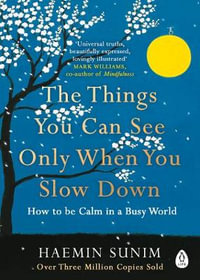
Thinking It Through
An Introduction to Contemporary Philosophy
Paperback | 1 January 2004
At a Glance
446 Pages
21.59 x 13.97 x 2.29
Paperback
$100.73
or 4 interest-free payments of $25.18 with
orAims to ship in 7 to 10 business days
Ideal for introductory philosophy courses, Thinking It Through is organized around eight central topics--mind, knowledge, language, science, morality, politics, law, and metaphysics. It traces how philosophers in the past have considered each subject (how Hobbes, Wittgenstein, and Frege, for example, approached the problem of language) and then explores some of the major questions that still engage philosophers today. More importantly, Appiah not only explains what philosophers have thought but how they think, giving students examples that they can use in their own attempts to navigate the complex issues confronting any reflective person in the twenty-first century. Filled with concrete examples of how philosophers work, Thinking it Through guides students through the process of philosophical reflection and enlarges their understanding of the central questions of human life.
Industry Reviews
CHAPTER 1: MIND 1.1. Introduction 1.2. Descartes: The beginnings of modern philosophy of mind 1.3. The private-language argument 1.4. Computers as models of the mind 1.5. Why should there be a functionalist theory? 1.6. Functionalism: A first problem 1.7. A simple-minded functionalist theory of pain 1.8. Ramsey's solution to the first problem 1.9. Functionalism: A second problem 1.10. M again 1.11. Consciousness 1.12. The puzzle of the physical 1.13. Conclusion
CHAPTER 2: KNOWLEDGE 2.1. Introduction 2.2. Plato: Knowledge as justified true belief 2.3. Descartes' way: Justification requires certainty 2.4. Locke's way: Justification can be less than certain 2.5. The foundations of knowledge 2.6. Ways around skepticism I: Verificationism 2.7. Ways around skepticism II: Causal theories of knowledge 2.8. Causal theories contrasted with traditional accounts of justification 2.9. Epistemology naturalized 2.10. Conclusion
CHAPTER 3: LANGUAGE 3.1. Introduction 3.2. The linguistic turn 3.3. The beetle in the box 3.4. Frege's "sense" and "reference" 3.5. Predicates and open sentences 3.6. Problems of intensionality 3.7. Truth conditions and possible worlds 3.8. Analytic-synthetic and necessary-contingent 3.9. Natural language and logical form 3.10. Using logic: Truth preservation, probability, and the lottery paradox 3.11. Logical truth and logical properties 3.12. Conventions of language 3.13. The paradox of analysis 3.14. Conclusion
CHAPTER 4: SCIENCE 4.1. Introduction 4.2. Description and prescription 4.3. An example: Gregor Mendel's genetic theory 4.4. Theory and observation 4.5. The received view of theories 4.6. The deductive-nomological model of explanation 4.7. Theory reduction and instrumentalism 4.8. Theory-ladenness 4.9. Justifying theories I: The problem of induction 4.10. Goodman's new riddle of induction 4.11. Justifying theories II: Popper and falsification 4.12. Justifying theories III: Inference to the best explanation 4.13. Laws and causation 4.14. Conclusion
CHAPTER 5: MORALITY 5.1. Introduction 5.2. Facts and values 5.3. Realism and emotivism 5.4. Intuitionism 5.5. Emotivism again 5.6. Kant's universalizability principle 5.7. Dealing with relativism 5.8. Prescriptivism and supervenience 5.9. Problems of utilitarianism I: Defining "utility" 5.10. Problems of utilitarianism II: Consequentialism versus absolutism 5.11. Rights 5.12. Self and others 5.13. Conclusion
CHAPTER 6: POLITICS 6.1. Introduction 6.2. Hobbes: Escaping the state of nature 6.3. Problems for Hobbes 6.4. Game theory I: Two-person zero-sum games 6.5. Game theory II: The prisoners' dilemma 6.6. The limits of prudence 6.7. Rawl's theory of justice 6.8. The difference principle and inequality surpluses 6.9. Criticizing Rawls I: The structure of his argument 6.10. Criticizing Rawls II: Why maximin? 6.11. Criticizing Rawls III: The status of the two principles 6.12. Reflective equilibrium 6.13. Are the two principles right? 6.14. Nozick: Beginning with rights 6.15. The entitlement theory 6.16. Ethics and politics 6.17. Conclusion
CHAPTER 7: LAW 7.1. Introduction 7.2. Defining "law" I: Positivism and natural law 7.3. Defining "law" II: Legal systems and the variety of laws 7.4. Hart: The elements of a legal system 7.5. Punishment: The problem 7.6. Justifying punishment: Deterrence 7.7. Retributivism: Kant's objections 7.8. Combining deterrence and retribution 7.9. Deterrence theory again 7.10. Why do definitions matter? 7.11. Conclusion
CHAPTER 8: METAPHYSICS 8.1. Introduction 8.2. An example: The existence of numbers 8.3. "God" as a proper name 8.4. The necessary being 8.5. Hume: No a priori proofs of matters of fact 8.6. Kant: "Existence: is not a predicate 8.7. A posteriori arguments 8.8. The argument from design 8.9. The harmony of nature 8.10. The necessity of a creative intelligence 8.11. Hume's argument from design: The argument from experience 8.12. The problem of evil and inference to the best explanation 8.13. Conclusion
CHAPTER 9: PHILOSOPHY 9.1. Introduction 9.2. Traditional thought 9.3. Arguing with the Azande 9.4. The significance of literacy 9.5. Cognitive relativism 9.6. The argument against strong relativism 9.7. The argument for weak relativism 9.8. Philosophy and religion 9.9. Philosophy and science 9.10. An example: Free will and determinism 9.11. Compatibilism and moral responsibility 9.12. The special character of philosophy 9.13. Conclusion Notes Index
ISBN: 9780195134582
ISBN-10: 0195134583
Published: 1st January 2004
Format: Paperback
Language: English
Number of Pages: 446
Audience: College, Tertiary and University
Publisher: Oxford University Press USA
Country of Publication: US
Dimensions (cm): 21.59 x 13.97 x 2.29
Weight (kg): 0.49
Shipping
| Standard Shipping | Express Shipping | |
|---|---|---|
| Metro postcodes: | $9.99 | $14.95 |
| Regional postcodes: | $9.99 | $14.95 |
| Rural postcodes: | $9.99 | $14.95 |
How to return your order
At Booktopia, we offer hassle-free returns in accordance with our returns policy. If you wish to return an item, please get in touch with Booktopia Customer Care.
Additional postage charges may be applicable.
Defective items
If there is a problem with any of the items received for your order then the Booktopia Customer Care team is ready to assist you.
For more info please visit our Help Centre.























